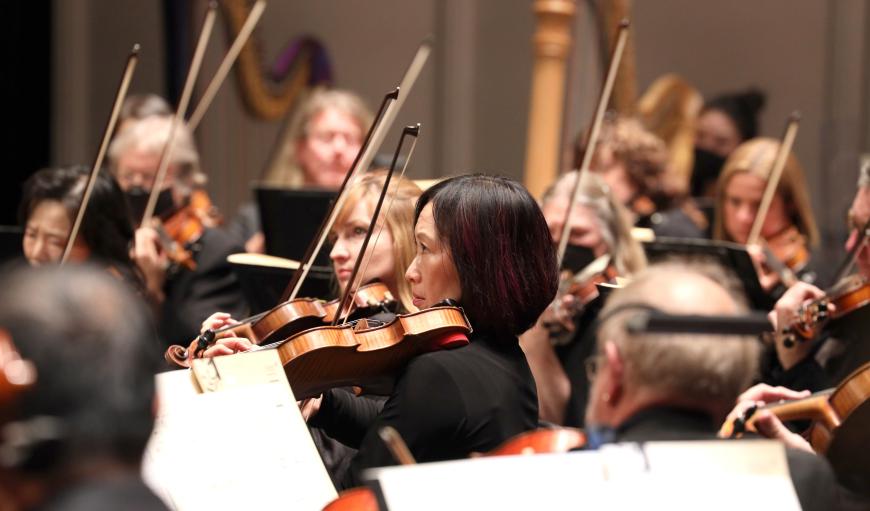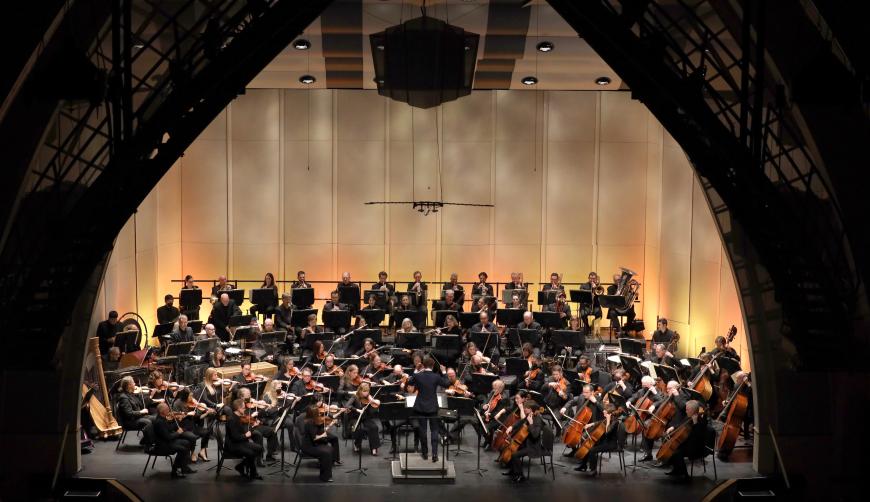
The Monterey Symphony played perhaps the most distinctive concert of its season on Sunday, April 21 at its regular venue of the Sunset Center in Carmel. The program consisted of four meditative, even elegiac pieces, an unbroken afternoon of contemplation. Not that any of the works were consistently peaceful or even quiet: All four rose to climaxes of emotional expressiveness.
Music Director Jayce Ogren chose this program as an opportunity to perform two unusual modern British works for which he has a special feeling. One was A Pastoral Symphony by Ralph Vaughan Williams (retroactively numbered the composer’s Third Symphony).

Vaughan Williams symphonies are rare enough in American concert halls, and the Pastoral is almost never played. It’s in four movements — “all of them slow,” the composer quipped, accurately enough — and the tempos and title have given it a reputation for being dull and eventless. But the symphony is not a depiction of a quiet English farm, despite the references to English folk song; rather, it is a memorial to the killing fields of France in World War I. Composed from 1919–1921, this was Vaughan Williams’s response to what he had seen and experienced as an ambulance driver on the front.
There is a considerable amount of agitation and even anguish in this symphony — and a degree of jauntiness in the “slow dance” of the third movement. On Sunday, the climax in the finale felt more cathartic than painful. Throughout the work, Ogren exploited the chordal melodies and contrapuntal exchanges to create a rich stew of sound highly characteristic of Vaughan Williams: enveloping and as caressing as it was stark. Little solos for individual instruments decorated the work. A few of these were slightly dicey in execution, but the overall effect worked well. Tenor Sean Panikkar gently sang the wordless vocal cadenzas that frame the finale. At the end, still singing, he walked slowly up an aisle of the auditorium, bringing the music directly into the audience.
Panikkar was also featured in the other British work on the program, Benjamin Britten’s Serenade for Tenor, Horn, and Strings. Panikkar sang these five English poems in a strong, textured tone, with minimal vibrato and clear, precise diction.
The solo horn was Monterey Symphony principal Daniel Nebel. His tone also had a strong texture, a calculated minuscule roughness that evoked a hunting horn. Despite the boldness of his solo work, he kept his sound carefully behind Panikkar’s when they were orating simultaneously. And Panikkar engaged with Nebel as well, turning and addressing him directly when singing Alfred Tennyson’s references to bugles and “the horns of Elfland faintly blowing.” The emphasis on the words gave this performance sincerity and meaningfulness.

Two short elegies rounded out the program. Arvo Pärt’s Cantus in Memory of Benjamin Britten is an eerie, almost uncanny exercise in using minimal means to achieve profound ends. To the slow, quiet tolling of a chime, lightly shining strings play descending minor-mode scales, finally arriving at a low tonic chord and then suddenly cutting out, leaving the last toll of the chime quietly ringing in the distance.
Adolphus Hailstork’s Epitaph for a Man Who Dreamed, in memory of Martin Luther King Jr., also begins with quiet strings. Ogren’s decision to have it preceded by strikes on the chime consequently made for a strong resemblance to the Pärt. But Hailstork’s Epitaph slowly builds to full orchestra in a dignified conservative style enlivened by some blue notes and concludes with a strong emotional outcry.
Sunday’s concert was enhanced and unified by more than just musical means. Quietly tasteful illustrations for each piece (and the lyrics when it came to the Britten) were projected onto the back wall, less distractingly than how other ensembles I’ve seen have done this.
And prior to the Pastoral Symphony, Monterey Symphony President Nicola Shangrow Reilly recited a new verse by noted local poet (and orchestra subscriber) Neal Whitman, titled “It was not really a great war.”
The avowed purpose of this concert was to give the audience a quietly meaningful emotional experience. As an experiment in subdued expression, it was gratifyingly successful.



